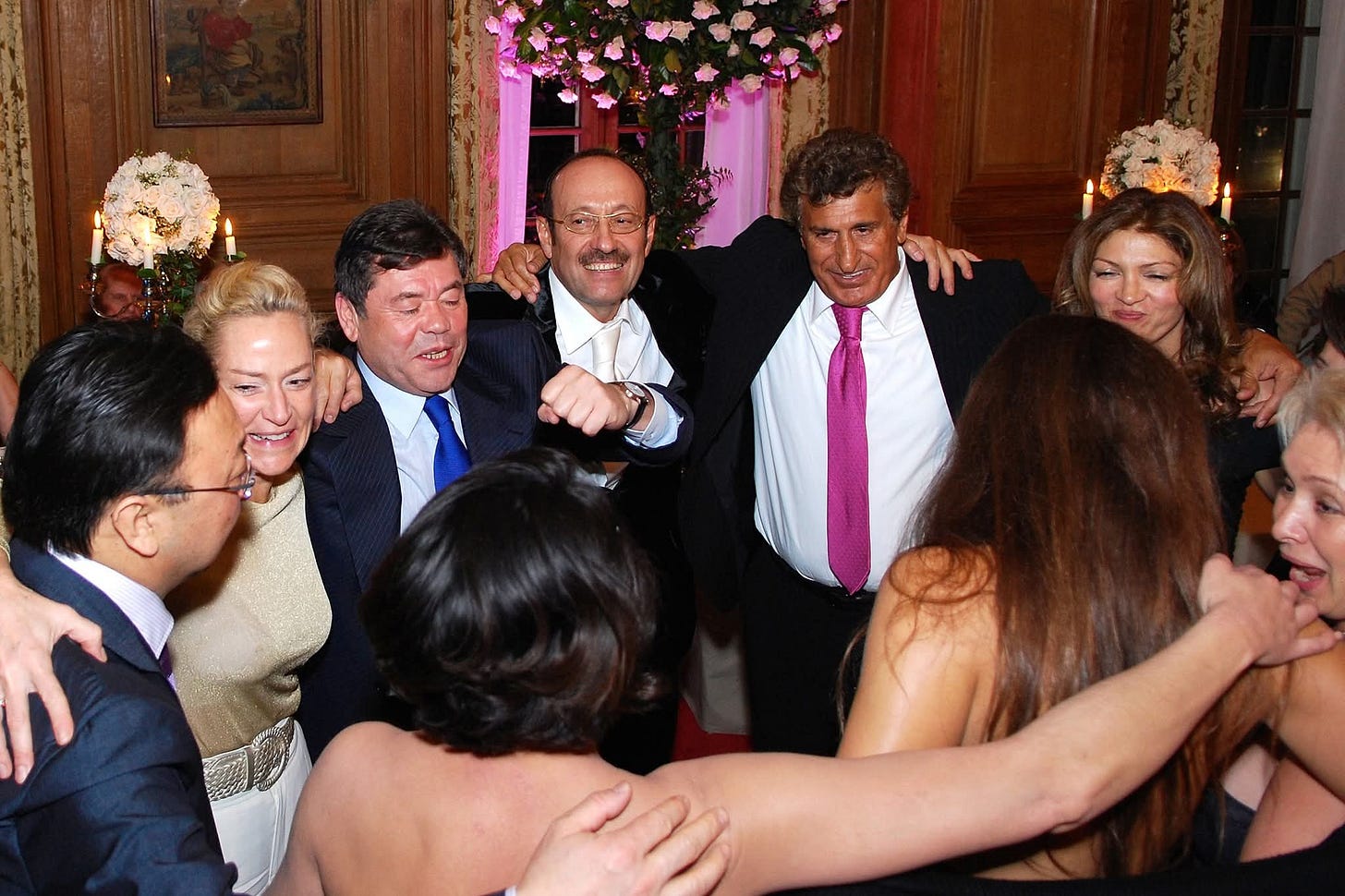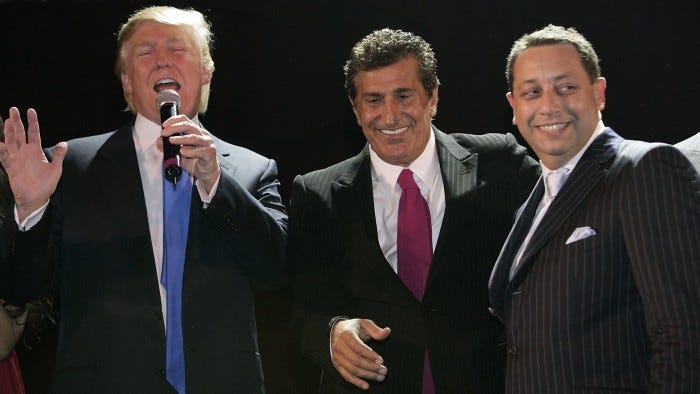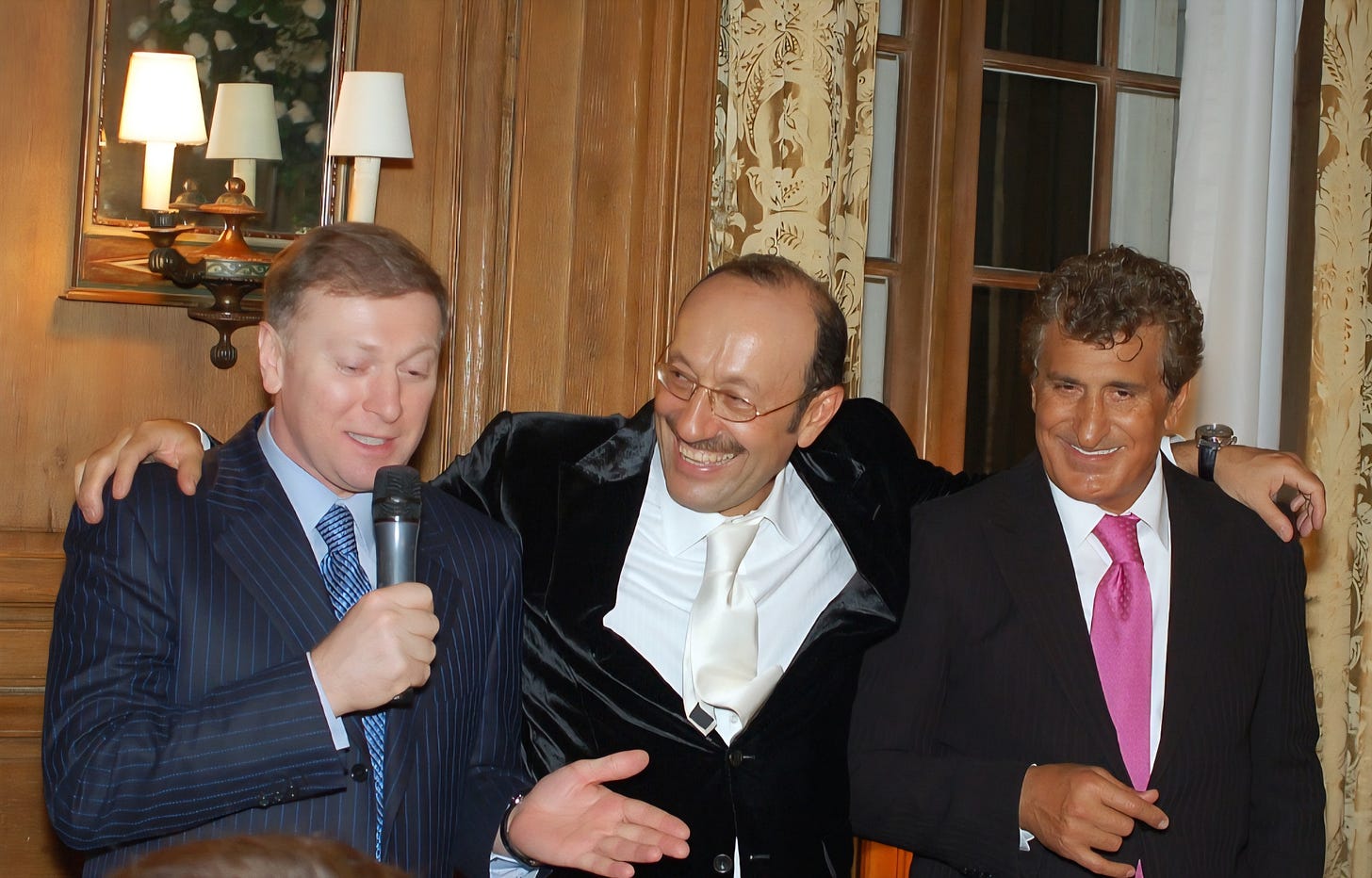SMILING FOR PUTIN
How Trump’s real estate deals, post-Soviet money, and a circle of Kazakh billionaires built the kompromat system Mussayev warned about
The allegations from former Kazakh intelligence chief Alnur Mussayev are already damning on their own. But once you start tracing the names he mentioned—Tevfik Arif, Alexander Mashkevich, Orifdzhan Shadiev—the picture grows even darker. Because these aren’t isolated figures. They’re part of a well-documented financial and political network that intersects repeatedly with Trump, Russian oligarchs, money laundering pipelines, and intelligence operations dating back to the KGB.
This isn’t about one party photo. It’s about decades of proximity between Trump and the men Mussayev claims were feeding kompromat into Putin’s hands.
Let’s start with Tevfik Arif, the velvet-jacketed businessman at the center of it all. Arif was born in Soviet Kazakhstan and spent years working in the USSR’s Ministry of Commerce and Trade before emerging as a hotel magnate and international developer. He founded Bayrock Group in 2001 and soon moved it into Trump Tower in Manhattan, operating just floors below Donald Trump. Bayrock partnered with Trump on the now-notorious Trump SoHo project—a 46-story condo hotel that became the blueprint for Trump’s cash-for-brand deals.
Arif didn’t work alone. Felix Sater, a convicted felon with mafia ties who later cooperated with the FBI, became Bayrock’s managing director. According to court filings, Sater helped funnel foreign capital—some of it from Icelandic firms with ties to Russian banks—into Trump-branded properties. One former finance executive at Bayrock described the firm as a money laundering front, claiming that millions moved through offshore shell companies without transparency.
Trump later claimed he barely knew Sater, despite having an office down the hall. He also insisted he didn’t know much about Arif, even though they appeared together at multiple public events. That plausible deniability took a hit in 2010, when Turkish authorities detained Arif aboard the Savarona yacht during a prostitution raid. He was accused of organizing sex work for wealthy clients, but was later acquitted by a Turkish court, which concluded all of the women involved were adults. Arif denied all wrongdoing, calling the allegations fabricated.
One of Arif’s closest associates—and another man in the photo Mussayev posted—is Alexander Mashkevich, a Kazakh-Israeli mining tycoon who built his empire in the post-Soviet resource rush. Alongside Patokh Chodiev and Alijan Ibragimov, Mashkevich formed the “Kazakh Trio,” dominating the metal and minerals trade across Central Asia. Their conglomerate, ENRC, was later investigated by the UK’s Serious Fraud Office for corruption, bribery, and cover-ups in Africa. ENRC eventually delisted from the London Stock Exchange, bought itself back, and reemerged as Eurasian Resources Group (ERG).
Some media outlets speculated that Mashkevich may have had ties to the 2010 yacht incident as well, though his representatives denied he was involved, and he was never formally charged. Regardless, his name has repeatedly surfaced in reports about political access, lavish private events, and philanthropic donations across the West—particularly in Israel and the U.S.—often in contexts that suggest a deliberate effort to rehabilitate or insulate elite reputations.
Then there’s Orifdzhan Shadiev, reportedly the third man standing in the image with Arif and Mashkevich. Shadiev is lesser known, but appears in regional business registries and was reportedly involved in Kazakh financial policy circles. His precise role remains opaque in English-language reporting, but Mussayev’s inclusion of him among this elite circle implies insider knowledge—another thread in the fabric Mussayev claims to have unraveled.
So is Bayrock. So is Trump Tower. So are the brand licensing deals that allowed foreign cash—some of it potentially untraceable—to flow into Trump’s orbit without scrutiny. Trump didn’t need to know the details. He just needed to look the other way. And according to Mussayev, he did—again and again.
These ties are not theoretical. They’ve been documented in court filings, offshore leaks, investigative reporting, and criminal investigations in multiple countries. And when Mussayev finally named the network publicly—accusing the FSB of running an international sexual blackmail operation with these men as conduits—he wasn’t spinning a yarn. He was amplifying patterns already visible in the financial record.
That’s what makes the kompromat so plausible. It’s not built on conspiracy. It’s built on connections we can see.
A real estate shell company in Delaware that links back to Bayrock.
A luxury yacht with high-powered men and allegations of illicit conduct.
A hotel project signed by Trump, funded by foreign cash, and later sued for fraud.
A mining empire investigated for bribery that still operates with Kremlin protection.
This isn’t one scandal. It’s a system.
Mussayev isn’t guessing. He’s pointing. And the longer we pretend these ties don’t matter, the longer the kompromat machine keeps running in the background—silently shaping policy, manipulating power, and keeping the man in the Oval Office obedient to something far beyond our borders.
This is the world Mussayev says we’re living in. And when you follow the money, the parties, the companies, and the names, it’s hard to argue he’s wrong.
They told us it was just a photo. Just another Russian rumor. Just noise. But when you follow the money, the names, the shell companies, and the yacht raids—when you trace the exact men a former intelligence chief says were feeding kompromat straight into Putin’s hands—you don’t get a conspiracy theory. You get a pattern. And if you believe that story deserves daylight, not a shallow grave, then back the journalists dragging it out brick by brick. Subscribe to Closer to the Edge. Because this isn’t a game. It’s a warning.







Thanks for lining this out. This kind of shit has been going on for years. Look at our involvement in Central & South America. There's no way Russia was going to sit around and let the US become the dark power of the world. Sadly, the voters in this country are now victims of the GOP long game against education and have trouble understanding their own government, much less its relationship to other global powers. Every little crack in the facade is more light on the corruption.
Hi BabsPHL, I am under the impression that the Savings & Loan scandal of the 1980s and 1990s was a bi-partisan screw up and thus did not blow up as it could have and probably to the extent it should have. Maybe this ‘kompromat’ is somewhat similar, maybe there are kompromats on a number of US elected officials and contributors and neither party has ever wanted to delve too far…just a thought.